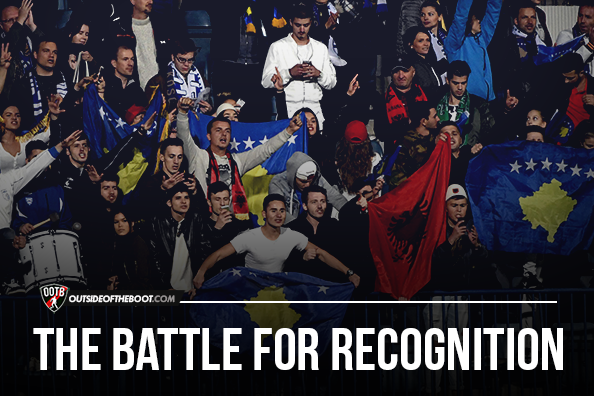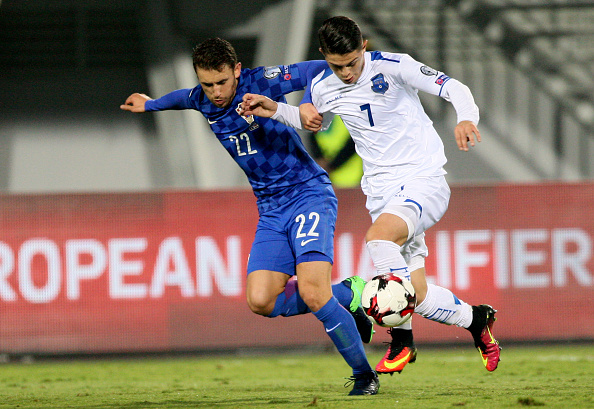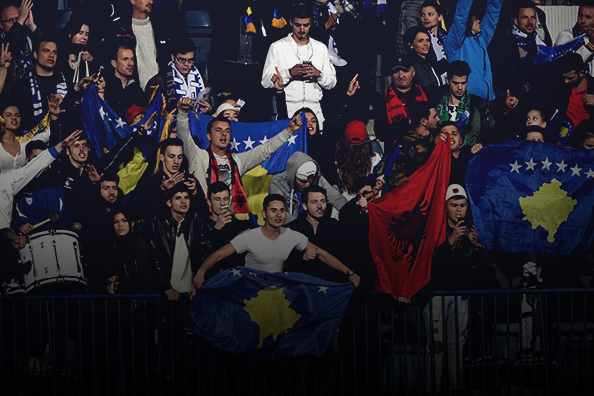Griffin O’Neill writes about the uphill battle Kosovo faced and continue to face in order to play international football.

What do you think of when you hear “Kosovo”? Many think of Kosovo as a war torn area of Eastern Europe with deeply rooted political and ethnic divides. Kosovo’s war for independence against Serbia in the late 1990s was a bloody and horrific conflict that scarred many citizens and displaced millions more. Because of this, the citizens of Kosovo have had little to rally around for many years, but recently the Kosovo national team has given the citizens of the poorest country in Europe something to get behind.
The Fight to Become a Team
Kosovo’s struggle for recognition in the footballing world has been well publicized over the past year, but let’s start from the beginning. Since Kosovo’s unilateral declaration of independence in 2008, they have been fighting for equal rights and recognition. They finally gained some of this in 2014 when then-FIFA president Sepp Blatter supported Kosovo’s bid to become a fully fledged UEFA member. Sadly, former UEFA president Michel Platini didn’t support the motion, but Kosovo was allowed to play in friendly matches.
Despite Blatter’s and Kosovo president of football Fadil Vokrri’s best efforts, the Balkan country was still only allowed to play in friendlies until in May of 2016 the motion was passed to make Kosovo a fully fledged member of UEFA and FIFA. This decision was widely opposed by Serbia and Russia, so much so that Serbia refused to allow Kosovo into its 2018 World Cup qualifying group. Kosovo was eventually put into Group I with Iceland, Turkey, Finland, Ukraine, and Croatia. So far, Kosovo has picked up only one point after four matches, 1-1 against Finland, and were severely embarrassed by Croatia 6-0. While it doesn’t appear as though they will reach Russia 2018, this outcome is acceptable to manager Albert Bunjaki. Bunjaki even said that qualification “isn’t realistic at all.” While this view may be seen as negative or just plain stupid, it is smart not to try and achieve a miracle in qualifying for the 2018 World Cup but to focus on the pressing issues that are plaguing the development of the Kosovo national team.
The Reaction of the Fans and The Stadium Crisis
Because of the different ethnic groups present in Kosovo, it was always going to be a struggle to garner large-scale support for the national team. This lack of national unity is shown every time there is a game. During the match against Finland, there were two screens in the Mother Teresa square in Pristina, the capital: one of those games was Kosovo against Finland, but the other was Albania versus Macedonia. This shows that the majority of fans aren’t exactly fanatical about their national team. In fact, during their pasting by Croatia, the biggest cheer of the night came when it was announced that Albania was leading Liechtenstein 2-0.
This lack of fan support is not helped by Kosovo’s stadium situation. In their first ever match, a friendly against Haiti in 2014, Kosovo played in the Adem Jashari Olympic Stadium in the city of Mitrovica. The match finished 0-0, but that was not the talking point after the match. The north half of Mitrovica is governed by Serbia, and the south by Kosovo. Because of this, Serbian officials banned the showing of the Kosovo flag inside of the stadium; furthermore, the stadium’s namesake is considered a terrorist by the Serbian government. Because of these restrictions, Kosovo was forced to find another stadium to host its international games. Sadly, the Adem Jashari is the only stadium within Kosovo that fits the FIFA regulations for international matches. The nearest appropriate stadium for Kosovo is therefore in Shköder, Albania. While the Kosovo flag is permitted there, it is not that common.
During Kosovo’s first home qualifying game against Croatia, there were as many Albanian flags as there were Kosovar or Croatian. This cultural disparity means that it will be hard to garner much concrete support at national matches until a permanent home can be found. Thankfully, Hungary has agreed to help finance the reconstruction of the Pristina Municipal Stadium. The stadium has been in a state of disrepair since the war, and because of a severe lack of funding, no real work has been done to fix it until now. Once reconstruction is finished, Kosovo will finally have a place to call home, which should help rally fan support and make the national team more and more popular.
The Players and Their Eligibility

Kosovo’s Milot Rashica (R) vies with Croatia’s Duje Cop (L) during the World Cup 2018 qualifier football match between Kosovo and Croatia in Loro Borici stadium in Shkoder on October 6, 2016. / AFP / GENT SHKULLAKU (Photo credit should read GENT SHKULLAKU/AFP/Getty Images)
Possibly the most controversial element of the Kosovo national team is the players who play for it. This multinational group has had to face seemingly insurmountable odds to be able to play together, but it all started with one man.
Samir Ujkani has endured a very tumultuous life. When war broke out in his hometown of Reznik, Ujkani and his family fled to Tielt, Belgium. Ujkani was eventually picked up by the Anderlecht academy and went on to play for Palermo in Serie A. When manager Albert Bunjaki was selecting his squad for the friendly against Haiti, he realized that Ujkani was his only viable option for keeper. When asked about the possibility of Ujkani not being able to play for Kosovo, Bunjaki said, “We will be fifty percent, it will not be a strong team.” Thankfully, Ujkani was allowed to play for, and captain, Kosovo even though he had represented Albania before. Ujkani’s successful switch of nationality was crucial to get the rest of Kosovo’s dual nationality players onto their team. This switch of nationality was not supported by Ujkani’s club, though. Palermo told Ujkani to “be careful,” and Ujkani said that club officials frequently put pressure on him not to represent Kosovo. When he told his teammates that he had chosen to represent Kosovo, some of them said,” It doesn’t exist.” Ujkani would reply,” Yes it does, I was born there, my family lived there. I lost family there.”
When Kosovo was finally admitted to UEFA, many players agreed to switch nationalities and represent them. However, it wasn’t easy. Many of the players were not given the go-ahead until six hours before their inaugural qualifier against Finland. it was well worth the wait, though; players such as RB Salzburg’s Valon Berisha, who has 32 caps for Norway, and Milot Rashica, who has been capped by Albania, were both allowed to represent Kosovo. While it may have been a lot of trouble to get these players registered, it was completely worth it. Rashica is one of the brightest talents in the Eredivisie for Vitesse and was the most vibrant attacker in the draw with Finland, while Berisha scored the penalty that earned Kosovo the draw.
Looking to the Future
While great strides have been made, there is still a lot to do. Gaining the recognition of other nations is one of the major things needed to become a major player on the international stage, and this has been an obvious problem for Kosovo. Their World Cup qualifier against Ukraine was played in Poland because Ukraine’s government refused to let the Kosovo players into their country. Countries such as Spain and Romania also haven’t recognized Kosovo yet, which poses a major problem for future World Cup and Euro qualifications.
One of the most interesting things about the future of the Kosovo team is the players that they could potentially have. Players such as Grant Xhaka, Adnan Januzaj and Xherdan Shaqiri all have Kosovar heritage and have all flirted with the idea of switching nationality. Xhaka appeared to be on the verge of switching until he allegedly received a letter from FIFA stating that he would not be able to switch after representing Switzerland at the 2016 European Championships (FIFA denies they sent this). Capturing even one of these superstars could potentially give the Kosovo national team the international prestige and recognition, both on and off the pitch, that they deserve.
- Scout Report: Alphonso Davies | Speedy Canadian winger - August 15, 2018
- Talent Radar: 5 breakthrough players to watch in the Bundesliga - August 15, 2018
- Scout Report: Patrick Cutrone | AC Milan’s sensational young forward - November 7, 2017





















































